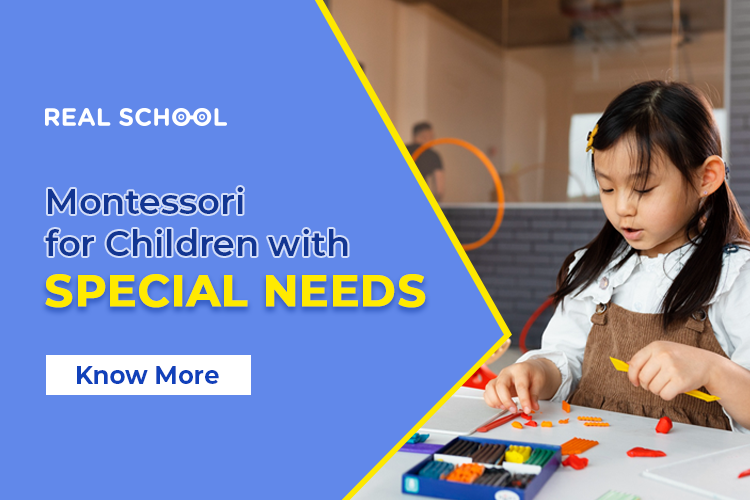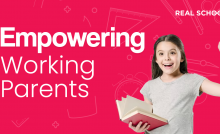Montessori for Children with Special Needs: The Right School for Education


Education is a fundamental right for every child, regardless of their abilities or special needs. It is crucial to provide an inclusive learning environment that caters to the unique requirements of children with special needs, allowing them to thrive and reach their full potential. In this regard, Montessori education has emerged as a remarkable approach that fosters individualised learning, self-discovery, and holistic development.
Montessori schools, known for their child-centered philosophy, have long been recognised for their effectiveness in nurturing young minds. By embracing this educational approach, children with special needs can experience a supportive and enriching environment that values their unique strengths and challenges. In this blog, we will explore why Montessori education is the right choice for children with special needs and how it caters to their diverse learning styles and abilities.
Also Read: What is Science Simple Definition for Kids? Let’s Grab the Knowledge for Kids Growth!
Montessori School for Children Education with Special Needs
Individualized Learning
- One of the cornerstones of Montessori education is the focus on individualized learning. In a Montessori classroom, each child is treated as a unique individual, with their own set of abilities, interests, and learning styles. This approach allows children with special needs to receive personalized attention and tailor-made learning experiences, ensuring they progress at their own pace. By adapting the curriculum and teaching methods to suit each child’s specific needs, Montessori schools provide a flexible and supportive learning environment.
Multi-Sensory and Hands-On Learning
Children with special needs often benefit from multi-sensory and hands-on learning experiences. Montessori education excels in this aspect by offering a wide range of tactile materials, manipulatives, and sensory activities. These materials engage children’s senses and facilitate experiential learning, making abstract concepts more tangible and concrete. Through these interactive experiences, children with special needs can enhance their cognitive, motor, and social skills in a meaningful and enjoyable way.
Independence and Self-Directed Learning
- Another vital aspect of Montessori education is fostering independence and self-directed learning. The Montessori approach encourages children to take responsibility for their education, make choices, and engage in self-paced learning. For children with special needs, this empowerment can be transformative. By providing opportunities for independent decision-making and self-discovery, Montessori schools help children build confidence, develop problem-solving skills, and cultivate a love for learning.
Inclusive and Supportive Environment
- In a Montessori classroom, inclusivity is at the core of the educational experience. Children with special needs are welcomed and embraced as valued members of the community. Montessori educators are trained to create supportive environments that foster empathy, understanding, and respect for individual differences. Additionally, the mixed-age classrooms found in Montessori schools provide opportunities for peer learning and collaboration, promoting social integration and emotional well-being.
Also Read: Best Online Coding Classes for Kids: How to Encourage Learning Coding for Kids?
Importance of Education of Children with Special Needs
Education of children with special needs is of utmost importance as it plays a crucial role in their overall development and well-being. Here are some key reasons highlighting the importance of education for children with special needs:
- Inclusive Society: Education promotes inclusivity and ensures that children with special needs are not excluded from mainstream society. It helps create an environment where individuals with diverse abilities can learn, interact, and contribute alongside their peers, fostering a sense of acceptance and understanding.
- Academic and Cognitive Development: Education provides children with special needs access to specialized instruction tailored to their unique learning styles and needs. It focuses on developing their academic skills, such as reading, writing, and math, while also nurturing their cognitive abilities. By addressing their specific challenges and building upon their strengths, education helps children with special needs reach their full potential.
- Social and Emotional Growth: School environments provide opportunities for children with special needs to socialize and develop meaningful relationships with their peers. Interaction with classmates and teachers fosters social skills, empathy, and emotional well-being. It also promotes self-confidence, self-esteem, and a positive sense of identity, which are vital for their overall growth and integration into society.
- Independence and Life Skills: Education equips children with special needs with essential life skills that enable them to become more independent and self-reliant. It focuses on areas like communication, problem-solving, decision-making, and daily living skills, preparing them for adulthood and enhancing their chances of leading fulfilling and independent lives.
- Employment and Future Opportunities: Quality education opens doors to better employment prospects and future opportunities for children with special needs. By acquiring knowledge, skills, and qualifications, they can access vocational training, higher education, and meaningful employment, empowering them to contribute to society and lead fulfilling lives.
- Advocacy and Rights: Education serves as a platform for advocating the rights of children with special needs and raising awareness about their abilities and needs. It fosters a society that recognizes and respects their rights to equal opportunities, accessibility, and non-discrimination, promoting a more inclusive and equitable society for all.
- Support for Families: Education of children with special needs provides crucial support to their families. It offers guidance, resources, and a network of professionals who work collaboratively with families to address their child’s educational and developmental needs. Education empowers families to actively participate in their child’s education, ensuring a holistic and supportive environment for their growth.
The education of children with special needs is vital for their holistic development, integration into society, and the realization of their full potential. It promotes inclusivity, academic and cognitive growth, social and emotional well-being, independence, future opportunities, advocacy, and support for both the children and their families.
Also Read: Best Online Coding Classes for Kids: How to Encourage Learning Coding for Kids?
Conclusion
In conclusion, the establishment of Real School by uFaber for children with special needs holds immense importance in ensuring their holistic development and inclusion in society. This school offer specialized education, individualized support, and a nurturing environment that caters to the unique needs of these children. By focusing on their academic, social, and emotional growth, Real School empowers children with special needs to reach their full potential, enhance their quality of life, and enable them to actively participate in the community. Through their commitment to inclusivity and providing equal opportunities, these schools play a vital role in building a more inclusive and equitable society where every child, regardless of their abilities, can thrive and succeed.
Recent Posts
What are the Advantages of Online Teaching at The Real School?
In the article -"What are the Advantages of Online Teaching at The Real School?" we…
What is the Full Form of School?: Unveiling the Acronym
The term "school" carries profound significance in the realm of education, representing more than just…
What is Math Full Form?: Cracking the Code
Mathematics, often referred to as "Math," is a subject that elicits various reactions from students…
What is Full Form of Homework?: Decoding Academics
Homework, an integral part of the academic journey, often raises questions about its purpose and…
What is Full Form of Teacher?: Demystifying Education
In the intricate tapestry of education, teachers stand as the pillars shaping the intellectual and…
What is Real Education?: Discovering Its Essence and Impact
The concept of real education is evolving, transcending traditional views that equate it solely with…


